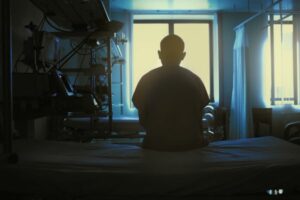From Christopher Lane, PhD/Psychology Today: “‘This isn’t a book about mental illness or the mentally ill,’ Rob Wipond tells me over email about his eye-opening investigation, Your Consent Is Not Required: The Rise in Psychiatric Detentions, Forced Treatment, and Abusive Guardianships (BenBella Books, 2023). ‘It’s a book about the expanding uses of mental health laws throughout society on people from all walks of life.’
Though most studies of psychiatry focus on voluntary, outpatient treatment to assess impacts on the largest number of patients, the rates of North Americans detained involuntarily—including by civil commitments, crisis calls, and police ‘wellness’ checks—are more than double and triple those in the U.K., Sweden, Finland, Germany, and France . . .
‘We help more people than we hurt’
To the question, ‘Does forced treatment improve mental health?,’ in one of the 28 chapters in Wipond’s book that takes us from ‘blindingly brisk’ courtroom hearings to harrowing ‘wellness’ checks and near-inescapable guardianships, he can answer with a clear and decisive ‘no.’
Despite administrators hoping to reassure him that ‘the system is well-intentioned,’ that ‘we help more people than we hurt,’ and that ‘from our end, we really are doing our best to help our patients and our best to promote good practice and good care,’ Wipond’s comprehensive study unearths health and social services replete with poor-to-dreadful outcomes, lax oversight, and protocols seemingly rigged against those most in need: the vulnerable, destitute, and marginalized.
Far from being able to point to improvements in patient outcomes, Your Consent Is Not Required describes a series of ‘better-safe-than-sorry’ decisions and ‘I-know-it-when-I-see-it’ diagnoses and managerialism that funnels people into forced ‘treatment,’ with the consequence that staff sometimes begin to ‘feel they have this right to administer any type of intervention,’ while those detained are forced to be submissive and ‘compliant’—to consent to ‘treatment,’ frequently by sedatives, antidepressants, and antipsychotics, even when unwanted. In the case of Wipond’s father, and over the objections of family, the treatment extended to electroshock ‘therapy,’ or ECT.
‘That’s what bothers me the most, even more than my father’s death,’ one interviewee tells him of her father’s forced treatment for mild dementia, on drugs to which he had a ‘severe adverse reaction,’ after 11 days in psychiatric detention mean her once-functional father is discharged ‘in diapers on a gurney.’ ‘The violation of his agency, his integrity. The more he tried to assert his rights, the more he was accused of not making sense.’
‘Your normal reaction as a citizen, or a human being, is to get angry,’ another interviewee affirms of the repeat police visits he endures, ‘and tell them to get the hell out of your apartment. But you’re afraid to actually get angry, because you’re sure they’ll use that against you. It’s degrading. I felt intimidated, and afraid. It was the fact that they could just come like that at any time, bang on your door, charge in, and possibly haul you away.’
‘Everything I did was pathologized’
. . . Under psychiatric detention, Wipond cautions, ‘you do not have the right to remain silent. Refusing to answer a psychiatrist’s questions, even about your most intimate inner experiences, can be and often is considered evidence of a mental disorder.’
With police questioning added to already stressful situations, events can quickly escalate: ‘If you’re too vocal, if you’re not vocal enough, if you cry, if you don’t cry, if you say you’re getting lawyers, if you ask to read the paperwork too much—any of it confirms your mental health “diagnosis.” You’re crazy, you’re wrong, you’re misinterpreting, you’re overreacting. There’s a lot of room for things to be recontextualized as symptoms of mental disorders.’
. . . Your Consent Is Not Required opens with a powerful account of the forced ‘treatment’ of Wipond’s father, who says one day he feels like the ceiling of the house is ‘caving in on him.’ An attending psychiatrist advises that he has ‘a biochemical imbalance, like diabetes or a broken leg but in his brain.’ Later, when the drug treatments fail, the family is told that ECT is ‘like a heart defibrillator’ that ‘jolts the depressed brain back to life.’ ‘I don’t want it,’ Wipond’s father is firm and resolute, ‘his voice barely audible over the telephone. ‘I don’t want it,’ Dad said, more feebly. The psychiatrists scheduled the ECT.'”

***
Back to Around the Web











